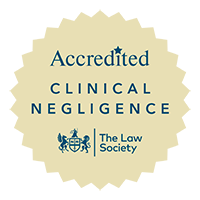Top ranked cerebral palsy claims lawyers

In 2019 the National Institute of Health Research funded a trial to look at whether a regular test for group B strep (GBS) infection would improve the prevention of early onset group B streptococcal infections in babies.
The trial was to be held across 80 hospitals throughout England, Wales and Scotland. Its aim was to consider whether the standard approach to identifying women who have risk factors for a baby developing infection should be changed to include proactive testing at 35 to 37 weeks of pregnancy, to identify pregnant women who carry the GBS bacteria.
We recently heard that this trial has been halted, given the pressure on hospital laboratories during the COVID-19 pandemic. Given the potential benefits of standardised GBS screening and effective treatment for so many pregnant women and their children, we remain hopeful that the trial will be able to recommence soon.
What is group B strep?
Group B strep is a common bacterium. Approximately 20% of people have it living in their body. GBS can live in the vagina. This means that babies of mothers who carry GBS are particularly at risk of infection from GBS from contact with the bacteria after the waters break and during birth.
GBS is harmless to those women who carry it during labour but can lead to meningitis and sepsis in vulnerable newborn babies whose immune systems are not strong enough to fight it off. GBS is the single major infective cause of death in newborn babies, but although serious injury and death from GBS infection is avoidable, it is often not known that a baby has it until it is too late.
What is the impact of group B strep?
Around 800 babies a year develop a GBS infection in the UK and, of those that do, 50 will die – the majority within the first 24 hours of life. 70 more are likely to be left with life-changing disabilities, including brain damage, and will require a lifetime of personal care and support
So, how do I know if I am carrying group B strep?
Women with group B strep generally have no symptoms, and the only way to diagnose that they carry the bacteria is to have a test for it. An enriched culture medium or ECM test can be carried out in pregnancy. Alternatively, there is a new rapid test which can be carried out during labour.
The trial was also set to examine whether screening all pregnant women for GBS should become standard practice, as it is in other developed countries such as the US, France, Spain, Canada and Australia.
Can GBS be treated?
Antibiotics can be given in labour, which reduce the chance of a baby developing group B strep by 80-90%. However, antibiotics are only routinely given to mothers in labour where GBS has been identified.
What is the current research on GBS?
The recommendation of the Royal College of Obstetricians and Gynaecologists (RCOG) is that the ‘gold standard’ enriched culture medium (ECM) swab test should be used. However, many hospitals use an alternative test which is believed to give a higher number of false negative results.
Prompted by the delay in the new trial, the Health Minister, Nadine Dorries, has now written to hospital chief executives, asking them to ensure that when a woman is swabbed for GBS in a risk assessment, the ECM test is used, as recommended by the RCOG.
What will change after the trial?
It is hoped that the trial will provide solid evidence that screening for every pregnant woman in the UK at a clinic check at 35 to 37 weeks of pregnancy would dramatically reduce the number of GBS complications at birth, such that this process becomes standard practice.
Boyes Turner’s birth and neonatal brain injury specialists have recovered substantial compensation for children whose brain injuries and devastating disability were caused by delays in diagnosis and treatment of early onset GBS infection. We await the outcome of this important research, in the hope that fewer babies will be injured by this serious disease.
If you are caring for a child with brain injury or neurological disability caused by medical negligence, you can find out more about making a claim, free and confidentially, contact us by email at cerebralpalsy@boyesturner.com.
They have a great deal of knowledge and expertise, and client care seems to be their top priority.
Chambers Guide to the Legal Profession
Contact our expert Cerebral Palsy solicitors today for support with your claim




